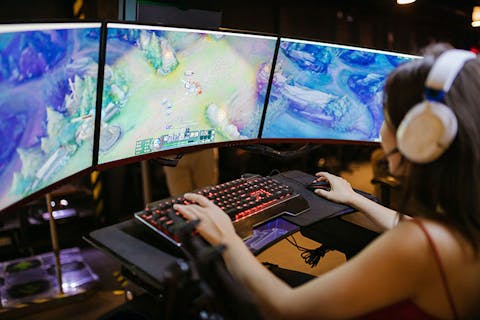In the world of online gaming, having a stable and high-performance network connection can mean the difference between victory and defeat. Lag, latency, and disconnections can frustrate even the most skilled players, making it crucial to optimize your gaming network setup. Whether you’re a casual gamer or a competitive eSports player, this guide will help you enhance your gaming experience through effective networking strategies.

1. Choose the Right Internet Connection
The foundation of any great gaming setup is a reliable internet connection. While both cable and fiber-optic connections are excellent choices, there are important factors to consider:
- Speed: Look for a plan with at least 25 Mbps download speed for casual gaming and 50 Mbps or higher for competitive gaming. Higher speeds help reduce latency and provide a smoother experience.
- Wired vs. Wireless: While Wi-Fi can be convenient, a wired Ethernet connection is generally more reliable and offers lower latency. If possible, connect your gaming device directly to the router using an Ethernet cable.
2. Optimize Your Router Settings
Your router plays a critical role in your gaming experience. Optimizing its settings can significantly enhance performance:
- Quality of Service (QoS): Enable QoS settings to prioritize gaming traffic over other types of data on your network. This ensures that your gaming packets are sent and received first, reducing lag.
- Change the Channel: If you’re using Wi-Fi, switch to a less congested channel. Use tools like Wi-Fi Analyzer to find the best channel for your router.
- Firmware Updates: Regularly check for firmware updates for your router. Updated firmware can improve performance and security, enhancing your overall gaming experience.
3. Limit Bandwidth Usage
Excessive bandwidth consumption from other devices can lead to latency and lag during gameplay. Here are some ways to manage bandwidth effectively:
- Disconnect Unused Devices: Identify and disconnect devices that are not in use, such as smartphones, tablets, or smart TVs, which may consume bandwidth.
- Schedule Downloads: Avoid downloading large files or streaming videos while gaming. Schedule updates and downloads for off-peak hours to ensure your connection remains stable during playtime.
- Use Ethernet Switches: If you have multiple gaming devices, consider using an Ethernet switch to connect them directly to your router, reducing wireless congestion.
4. Optimize Your Gaming Device
In addition to optimizing your network, it’s essential to ensure your gaming device is configured for peak performance:
- Close Background Applications: Before starting a game, close any unnecessary applications running in the background that may consume resources or bandwidth.
- Update Drivers: Keep your network drivers and gaming software up to date to ensure optimal performance and compatibility with the latest games.
- Adjust In-Game Settings: Experiment with in-game network settings to find the balance between performance and visual quality. Some games allow you to limit bandwidth usage or adjust server settings for a better connection.
5. Monitor Your Network Performance
Monitoring your network’s performance can help you identify issues before they become significant problems:
- Use Network Monitoring Tools: Tools like PingPlotter or NetSpot can help you monitor your connection stability and latency. These tools can pinpoint packet loss or latency spikes that may be affecting your gaming experience.
- Run Speed Tests: Regularly check your internet speed using tools like Ookla’s Speedtest. This will help you confirm that you’re getting the speeds you’re paying for and identify any fluctuations in performance.
6. Consider a Gaming VPN
In some cases, using a gaming VPN (Virtual Private Network) can enhance your online gaming experience by providing more stable connections and reducing lag:
- Reduced Latency: A good gaming VPN can help reroute your connection to a closer server, potentially reducing ping times.
- Improved Security: VPNs encrypt your data, protecting you from DDoS attacks and other online threats, making it safer to game online.
However, it’s essential to choose a reputable gaming VPN with servers optimized for gaming to avoid adding unnecessary latency.
Conclusion
Optimizing your network setup for online gaming can dramatically enhance your experience, allowing you to enjoy seamless gameplay with minimal interruptions. By choosing the right internet connection, optimizing your router settings, managing bandwidth usage, and ensuring your gaming device is performing at its best, you’ll be well on your way to becoming a formidable player.
In the competitive world of online gaming, every millisecond counts. By implementing these strategies, you can ensure that your gaming setup is optimized for performance, giving you the edge you need to succeed. Happy gaming!
